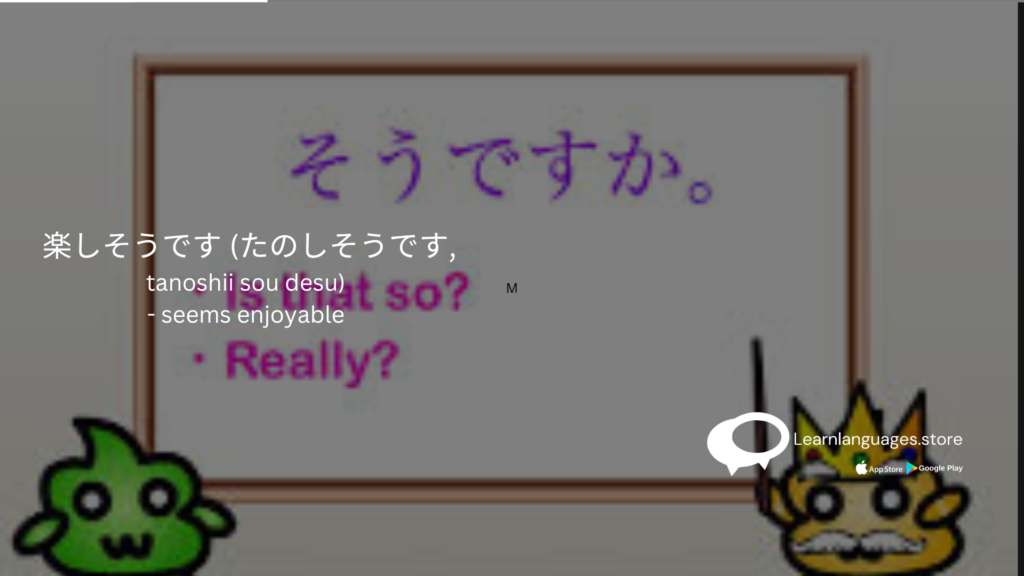Unveiling the Mystery of „Äú„Åù„ÅÜ„Åß„Åô (sou desu) in Japanese Grammar
Unveiling the Mystery of „Äú„Åù„ÅÜ„Åß„Åô (sou desu) in Japanese Grammar
Estimated reading time: 3 minutes
„Åì„Çì„Å´„Å°„ÅØ (Konnichiwa)! Today, we delve into the fascinating realm of Japanese grammar with the enigmatic expression „Äú„Åù„ÅÜ„Åß„Åô (sou desu). This expression is used to convey hearsay, assumptions, or appearances. Join me as we unravel its secrets, understand its structure, explore exceptions, and of course, enjoy some humorous examples along the way!

Decoding „Äú„Åù„ÅÜ„Åß„Åô (sou desu)
Sentence Structure
The structure of „Äú„Åù„ÅÜ„Åß„Åô (sou desu) is relatively simple:
- Start with the stem of an adjective or a verb.
- Add „Åù„ÅÜ„Åß„Åô (sou desu) after the stem to indicate “it seems that” or “I heard that.”
Examples with Different Adjectives and Verbs
- Adjective: Ê•Ω„Åó„ÅÑ („Åü„ÅÆ„Åó„ÅÑ, tanoshii) – enjoyable
- Stem: Ê•Ω„Åó („Åü„ÅÆ„Åó, tanoshi)
- Combined: Ê•Ω„Åó„Åù„ÅÜ„Åß„Åô („Åü„ÅÆ„Åó„Åù„ÅÜ„Åß„Åô, tanoshii sou desu) – seems enjoyable
- Adjective: È´ò„ÅÑ („Åü„Åã„ÅÑ, takai) – expensive
- Stem: È´ò„Åù„ÅÜ („Åü„Åã„Åù„ÅÜ, takasou)
- Combined: È´ò„Åù„ÅÜ„Åß„Åô („Åü„Åã„Åù„ÅÜ„Åß„Åô, takasou desu) – seems expensive
- Verb: Ë°å„Åè („ÅÑ„Åè, iku) – to go
- Stem: Ë°å„Åç („ÅÑ„Åç, iki)
- Combined: Ë°å„Åç„Åù„ÅÜ„Åß„Åô („ÅÑ„Åç„Åù„ÅÜ„Åß„Åô, iki sou desu) – seems to go
Pronunciation Guide Using Hindi Alphabets
- Ê•Ω„Åó„Åù„ÅÜ„Åß„Åô (tanoshii sou desu) – ý§§ý§®ý•ãý§∂ý•Ä ý§∏ý•ã ý§¶ý•áý§∏ý•Ç
- È´ò„Åù„ÅÜ„Åß„Åô (takasou desu) – ý§§ý§ïý§æý§∏ý•ã ý§¶ý•áý§∏ý•Ç
- Ë°å„Åç„Åù„ÅÜ„Åß„Åô (iki sou desu) – ý§áý§ïý§ø ý§∏ý•ã ý§¶ý•áý§∏ý•Ç
Example Sentences with Humor
- Ê•Ω„Åó„Åù„ÅÜ„Åß„Åô („Åü„ÅÆ„Åó„Åù„ÅÜ„Åß„Åô, tanoshii sou desu) – seems enjoyable
- Example: 明日は遊園地に行く予定です。楽しそうですね!
- Pronunciation: あしたはゆうえんちにいくよていです。たのしそうですね!(Ashita wa yuuenchi ni iku yotei desu. Tanoshii sou desu ne!)
- Hindi Translation: ý§ïý§≤ ý§Üý§™ý§ïý§æ ý§¨ý§öý•çý§öý•ãý§Ç ý§ïý•á ý§∏ý§æý§• ý§úý§æý§®ý•á ý§ïý§æ ý§™ý•çý§≤ý§æý§® ý§πý•àý•§ ý§Øý§π ý§¨ý§πý•Åý§§ ý§Æý§úý•áý§¶ý§æý§∞ ý§≤ý§ó ý§∞ý§πý§æ ý§πý•à!
- Humorous Twist: ý§úý§¨ ý§Üý§™ ý§èý§ï ý§¶ý§øý§® ý§ïý§æ ý§¨ý§öý•çý§öý§æ ý§πý•ãý§§ý•á ý§πý•àý§Ç, ý§§ý•ã ý§èý§ï ý§Øý§æý§§ý•çý§∞ý§æ ý§Øý§æ ý§èý§ïý•çý§∏ý§™ý•áý§∞ý§øý§Øý§®ý•çý§∏ ý§™ý§∞ ý§úý§æý§®ý§æ ý§πý§Æý•áý§∂ý§æ ý§Æý§úý•áý§¶ý§æý§∞ ý§πý•ãý§§ý§æ ý§πý•à!
- È´ò„Åù„ÅÜ„Åß„Åô („Åü„Åã„Åù„ÅÜ„Åß„Åô, takasou desu) – seems expensive
- Example: あのレストランは高そうですから、予算に合わないかもしれません。
- Pronunciation: あのレストランはたかそうですから、よさんにあわないかもしれません。(Ano resutoran wa takasou desu kara, yosan ni awanai kamoshiremasen.)
- Hindi Translation: ý§µý§π ý§∞ý•áý§∏ý•çý§§ý§∞ý§æý§Ç ý§Æý§πý§Çý§óý§æ ý§≤ý§óý§§ý§æ ý§πý•à, ý§áý§∏ý§≤ý§øý§è ý§Øý§π ý§¨ý§úý§ü ý§Æý•áý§Ç ý§®ý§πý•Äý§Ç ý§πý•ã ý§∏ý§ïý§§ý§æ ý§πý•àý•§
- Humorous Twist: ý§úý§¨ ý§Üý§™ý§ïý•Ä ý§§ý§ïý§®ý•Äý§ïý•Ä ý§öý§æý§≤ý§æý§ïý•Ä ý§îý§∞ ý§Üý§™ý§ïý§æ ý§≠ý•Çý§≤ý§≠ý•Åý§≤ý•àý§Øý§æ ý§™ý§∞ý•çý§∏ý•ãý§Çý§≤ý§øý§üý•Ä ý§¶ý•ãý§®ý•ãý§Ç ý§®ý§πý•Äý§Ç ý§ïý§æý§Æ ý§ïý§∞ý§§ý•Ä ý§πý•àý§Ç, ý§§ý•ã ý§èý§ï ý§Æý§πý§Çý§óý§æ ý§∞ý•áý§∏ý•çý§§ý§∞ý§æý§Ç ý§ïý•àý§∏ý•á ý§¨ý§ö ý§∏ý§ïý§§ý§æ ý§πý•à?
Usage and Exceptions
General Usage
„Äú„Åù„ÅÜ„Åß„Åô (sou desu) is used to convey hearsay, assumptions, or appearances. It’s a versatile expression commonly used in casual and formal conversations.
Exceptions
While versatile, „Äú„Åù„ÅÜ„Åß„Åô (sou desu) may not always accurately represent the speaker’s opinion or certainty. It’s essential to consider the context and tone of the conversation.
Conclusion
In conclusion, „Äú„Åù„ÅÜ„Åß„Åô (sou desu) adds depth and nuance to Japanese conversations by allowing speakers to express hearsay, assumptions, or appearances. With its simple structure and wide usage, mastering this expression is essential for effective communication in Japanese. So, go ahead and sprinkle some „Äú„Åù„ÅÜ„Åß„Åô (sou desu) into your conversations, and watch as your language skills flourish!
-
Product on sale
 Japanese N3
Japanese N3₹42,600.00
₹62,600.00 -
Product on sale
 Japanese N4
Japanese N4₹24,300.00
₹32,600.00 -
Product on sale
 Japanese N5
Japanese N5₹18,300.00
₹24,300.00
Learn Languages Store
Vashi,
Email: services@learnlanguages.store










